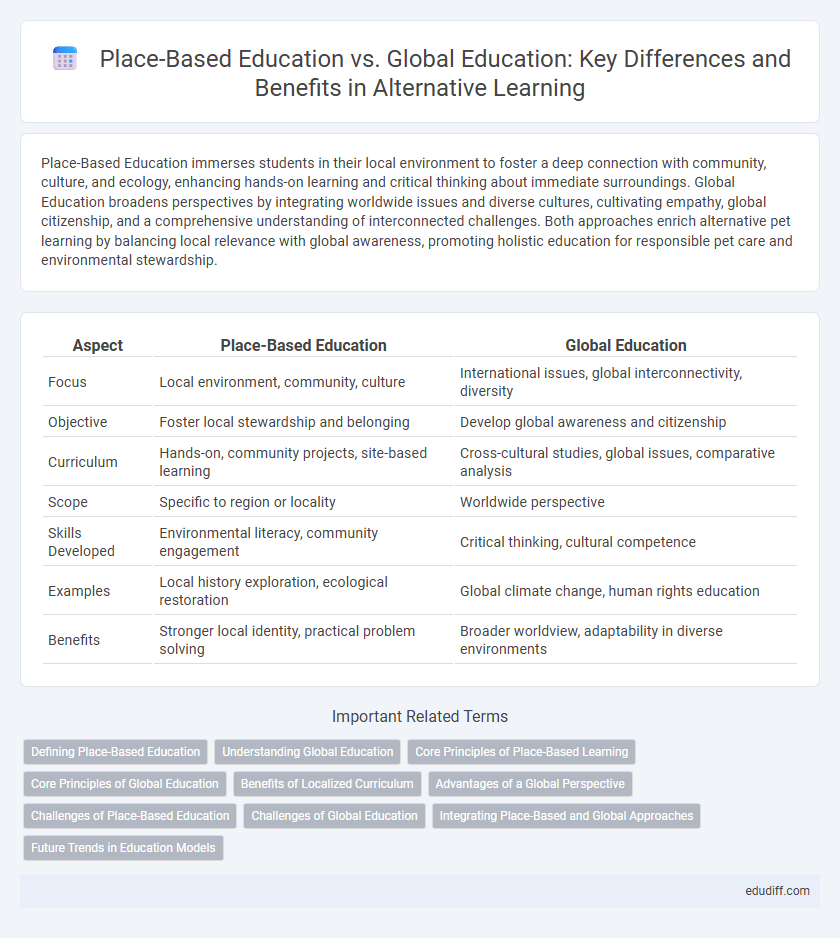Place-Based Education immerses students in their local environment to foster a deep connection with community, culture, and ecology, enhancing hands-on learning and critical thinking about immediate surroundings. Global Education broadens perspectives by integrating worldwide issues and diverse cultures, cultivating empathy, global citizenship, and a comprehensive understanding of interconnected challenges. Both approaches enrich alternative pet learning by balancing local relevance with global awareness, promoting holistic education for responsible pet care and environmental stewardship.
Table of Comparison
| Aspect | Place-Based Education | Global Education |
|---|---|---|
| Focus | Local environment, community, culture | International issues, global interconnectivity, diversity |
| Objective | Foster local stewardship and belonging | Develop global awareness and citizenship |
| Curriculum | Hands-on, community projects, site-based learning | Cross-cultural studies, global issues, comparative analysis |
| Scope | Specific to region or locality | Worldwide perspective |
| Skills Developed | Environmental literacy, community engagement | Critical thinking, cultural competence |
| Examples | Local history exploration, ecological restoration | Global climate change, human rights education |
| Benefits | Stronger local identity, practical problem solving | Broader worldview, adaptability in diverse environments |
Defining Place-Based Education
Place-Based Education emphasizes learning through direct interaction with the local environment, culture, and community to foster a deeper connection to one's immediate surroundings. It integrates local history, ecology, and social issues into curricula, promoting experiential and hands-on learning that enhances student engagement and relevance. This approach contrasts with Global Education by prioritizing localized knowledge and community involvement as tools for critical thinking and problem-solving.
Understanding Global Education
Global Education emphasizes interconnectedness by integrating diverse cultural perspectives and global issues into the curriculum, fostering critical thinking about worldwide challenges. This approach equips students with skills for cross-cultural communication and problem-solving on an international scale. Understanding Global Education requires recognizing its role in promoting global citizenship and sustainable development through experiential learning and collaborative projects.
Core Principles of Place-Based Learning
Place-based education centers on immersing students in local environments to foster a deep connection with their community, emphasizing experiential learning and ecological literacy. Core principles include utilizing the local culture, history, and natural surroundings as foundational curriculum elements, promoting stewardship and civic responsibility among learners. This approach contrasts with global education by focusing on site-specific knowledge and personalized learning experiences that strengthen place identity and sustainability awareness.
Core Principles of Global Education
Global Education emphasizes interconnectedness, cultural diversity, and social justice, fostering global citizenship through critical thinking and empathy. Its core principles include promoting awareness of global issues, understanding multiple perspectives, and encouraging active participation in addressing worldwide challenges. This approach aims to equip learners with the skills to navigate and contribute to an increasingly complex and interdependent world.
Benefits of Localized Curriculum
Place-Based Education enhances student engagement by connecting learning to local history, culture, and environment, fostering a deeper sense of community and place. This localized curriculum supports ecological literacy and sustainability by encouraging hands-on experiences with local ecosystems and resources. Moreover, students develop critical problem-solving skills and civic responsibility through relevant projects that address real-world community challenges.
Advantages of a Global Perspective
A global perspective in education enhances cultural awareness and fosters critical thinking by exposing students to diverse worldviews and complex global issues. It prepares learners for an interconnected economy by developing skills like cross-cultural communication and adaptability, which are essential in multinational workplaces. Integrating global education promotes empathy and social responsibility, encouraging students to engage with global challenges such as climate change and social justice.
Challenges of Place-Based Education
Place-Based Education faces challenges including limited resources and funding in local communities, which restrict access to relevant materials and field experiences. Geographic isolation can hinder collaboration with diverse educational partners and exposure to global perspectives. Adapting curriculum to reflect local culture while meeting standardized academic requirements often creates tension for educators trying to balance local relevance and global competencies.
Challenges of Global Education
Global education faces significant challenges including cultural homogenization, which risks overshadowing local identities and values. It often struggles with unequal access to resources and technology, limiting participation for marginalized communities worldwide. Balancing global competencies with localized relevance remains a critical issue in implementing effective global education programs.
Integrating Place-Based and Global Approaches
Integrating place-based education with global education cultivates a more comprehensive learning experience by connecting local environmental, cultural, and social contexts with broader global issues and perspectives. This approach enhances students' critical thinking and empathy, fostering a sense of responsibility both within their immediate communities and across diverse global populations. Educators implement project-based learning that aligns local inquiry with international case studies, promoting sustainable solutions that are locally relevant yet globally informed.
Future Trends in Education Models
Place-based education emphasizes local culture, environment, and community engagement to foster practical learning, while global education integrates multicultural perspectives and digital connectivity for a broader worldview. Emerging trends highlight hybrid models combining immersive local experiences with virtual international collaborations to prepare students for interconnected challenges. Future education frameworks prioritize adaptability, technology integration, and cross-cultural competencies to enhance both place-based and global learning outcomes.
Place-Based Education vs Global Education Infographic

 edudiff.com
edudiff.com